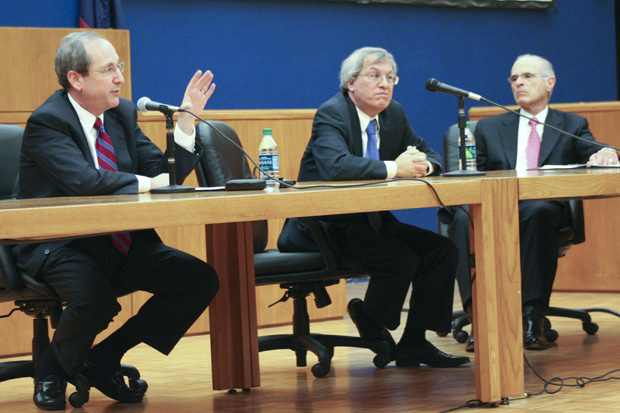Panel: 'Occupy' protests protected, with limitations
President Fred Lawrence participates in discussion at University of Houston Law Center

Brandeis President Fred Lawrence speaks at law forum at University of Houston.
“They have the right to be there,” said Erwin Chemerinsky, founding dean of the University of California, Irvine School of Law, “but they don’t have the right to be there 24 hours a day.” Frederick M. Lawrence, president of Brandeis University, agreed, saying city officials “have the right to say, ‘You can’t sleep in the park at night.’ ”
The two eminent scholars spoke at a program co-hosted by the Law Center and the Houston-regional Anti-Defamation League. “Extremism in a Civil Society,” examined First Amendment and free speech rights in general and specifically as they pertain to public and private schools.
[Watch video of panel discussion]
In introducing the two speakers, Law Center Dean Raymond T. Nimmer said the program had been in the planning stage for a long time, but noted it could not have been more timely with the upcoming presidential election and other events at home and abroad.
Chemerinsky outlined the basic principles of free speech, one of which is the government’s right to impose reasonable restrictions on time and place. There must be a place to hold demonstrations, he said, but the government doesn’t have to provide a place to camp.
Chemerinsky noted other free speech principles, including:
- Applies only to public institutions, for example schools, not private
- Can’t make content- or viewpoint-based restrictions. For example, can’t pick and choose between pro- and anti-war demonstrations
- Can’t restrict if simply offensive or even very offensive
- There are narrow categories of speech that are unprotected, for example, incitement of illegal activity, making threats, and causing a clear and present danger (shouting “Fire!” in a crowded theater)
- Restrictions must be clearly drawn and not overly broad
“We don’t need the First Amendment for speech we like,” Chemerinsky concluded. “What we really need the First Amendment for is the speech we detest.”
Lawrence noted that because Brandeis is a private university, “We operate in the shadow of the First Amendment,” and can say and do what leadership wants. He said the university could restrict content and ban offensive speech, but, “The fact that we can doesn’t mean we should.” The purpose of four years of college, he said, is to challenge students with different views and ideas in open discussion “within the confines of civility.” The school has excluded people from campus, including members of the Westboro Baptist Church who rally against homosexuality with obscene signs and picket military funerals with anti-American slogans. And, Lawrence said he believes burning a stack of Korans is protected, “but I wouldn’t let it happen on the Brandeis campus.”
Categories: Humanities and Social Sciences






